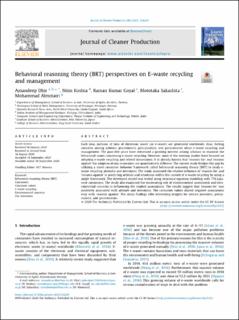| dc.contributor.author | Dhir, Amandeep | |
| dc.contributor.author | Koshta, Nitin | |
| dc.contributor.author | Goyal, Raman Kumar | |
| dc.contributor.author | Sakashita, Mototaka | |
| dc.contributor.author | Almotairi, Mohammad | |
| dc.date.accessioned | 2023-05-25T10:35:07Z | |
| dc.date.available | 2023-05-25T10:35:07Z | |
| dc.date.created | 2021-04-11T18:37:50Z | |
| dc.date.issued | 2021 | |
| dc.identifier.citation | Dhir, A., Koshta, N., Goyal, R. K., Sakashita, M. & Almotairi, M. (2021). Behavioral reasoning theory (BRT) perspectives on E-waste recycling and management. Journal of Cleaner Production, 280(1), 1-13. doi: | en_US |
| dc.identifier.issn | 0959-6526 | |
| dc.identifier.uri | https://hdl.handle.net/11250/3068984 | |
| dc.description.abstract | Each year, millions of tons of electronic waste (or e-waste) are generated worldwide, thus, fueling
concerns among scholars, practitioners, policymakers, and governments about e-waste recycling and
management. The past few years have witnessed a growing interest among scholars to examine the
behavioral issues concerning e-waste recycling. However, most of the existing studies have focused on
adopting e-waste recycling and related innovations. It is already known that ‘reasons for’ and ‘reasons
against’ the adoption of any innovation are quantitatively different. The current study bridges this gap by
utilizing a novel consumer behavior framework called behavioral reasoning theory (BRT) to study ewaste recycling attitudes and intentions. The study examined the relative influence of ‘reasons for’ and
‘reasons against’ in predicting attitude and intentions within the context of e-waste recycling by using a
single framework. The developed model was tested using structural equation modeling with 774 Japanese consumers. The study also examined the moderating role of environmental assessment and environmental concerns in influencing the studied associations. The results suggest that ‘reasons for’ was
positively associated with attitude and intentions. The consumer values shared negative associations
only with ‘reasons against.’ The study findings offer interesting insights for service providers, policymakers, and governments. | en_US |
| dc.language.iso | eng | en_US |
| dc.publisher | Elsevier | en_US |
| dc.rights | Navngivelse 4.0 Internasjonal | * |
| dc.rights.uri | http://creativecommons.org/licenses/by/4.0/deed.no | * |
| dc.title | Behavioral reasoning theory (BRT) perspectives on E-waste recycling and management | en_US |
| dc.type | Peer reviewed | en_US |
| dc.type | Journal article | en_US |
| dc.description.version | publishedVersion | en_US |
| dc.rights.holder | © 2020 The Author(s) | en_US |
| dc.subject.nsi | VDP::Teknologi: 500 | en_US |
| dc.source.pagenumber | 1-13 | en_US |
| dc.source.volume | 280 | en_US |
| dc.source.journal | Journal of Cleaner Production | en_US |
| dc.source.issue | Part 1 | en_US |
| dc.identifier.doi | 10.1016/j.jclepro.2020.124269 | |
| dc.identifier.cristin | 1903410 | |
| dc.source.articlenumber | 124269 | en_US |
| cristin.qualitycode | 2 | |

